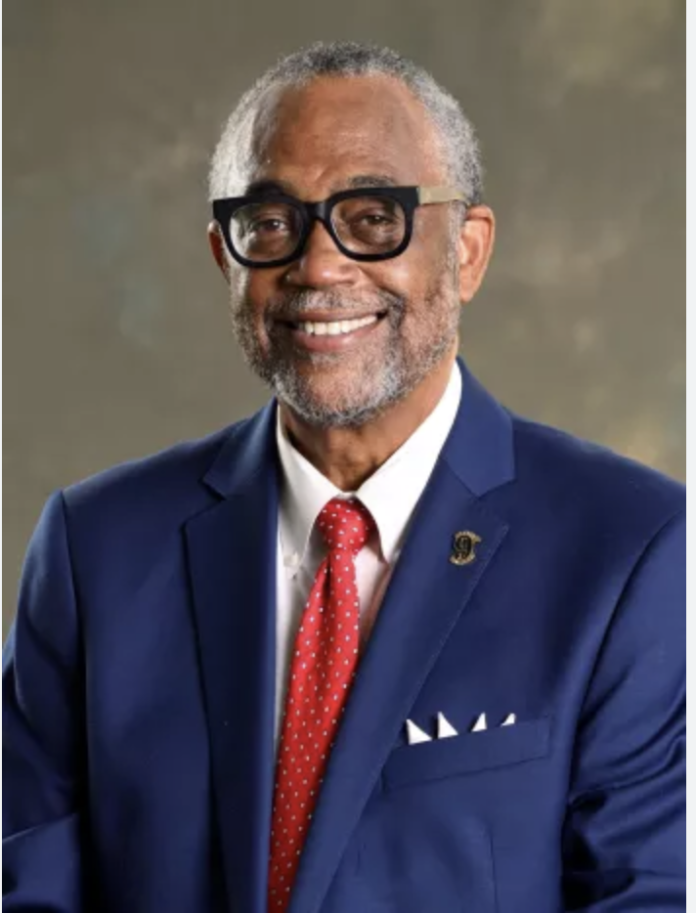
By Joe Bowers and Edward Henderson, California Black Med
In Appearance on Sean Hannity Show, Gov. Newsom Defends Record; Pushes Back on Go-To Conservative Putdowns
Last week, Fox News TV host Sean Hannity interviewed Gov. Gavin Newsom at the Governor’s Mansion in Sacramento.
The back-and-forth between Newsom and Hannity was intense at times, but remained civil, overall.
The two men, who have polar opposite political views, sparred over a range of issues, including immigration, taxes, and gun control.
Newsom defended his record and achievements and pushed back on favorite Republican criticisms of him, President Joe Biden and the Democratic party.
On immigration reform and building a border wall, Newsom said, “I want to address all these issues, but I want to do it in a rational way and not just bastardize the conversation as exclusively about the border,” said Newsom.
Watch the first clip Fox News released of the conversation between Newsom and Hannity.

Screenshot from the Sean Hannity and Gov. Newsom interview. // California Black Media
California Legislature Passes $311.7 Billion Budget: Proposal Contrasts With Governor’s $306.5 Billion Plan
On June 12, the California Legislature passed a $311.7 billion state budget.
In the Legislature’s proposal, some transit, climate change and childcare funding that Governor Newsom proposed cutting in his $306.5 billion spending plan, which was released in May, would be restored.
The Legislative Analyst’s Office projects that there will be a $34.5 billion deficit. To minimize the impact of this gap, the Legislature is proposing a mix of spending and revenue delays, cuts and shifts.
In their budget plan, lawmakers have chosen not to use $450 million from the state’s Safety Net Reserve unlike Newsom’s proposal. The plan rejects $2 billion in cuts to the Transportation Infrastructure Package. Bay Area and Los Angeles leaders were strong lobbyists for restoring the transportation funds. It also rejects a plan to delay funding for 20,000 subsidized child-care slots for low-income families and proposes releasing them on July 1, 2024. Lawmakers additionally committed $1 billion for another round of Homeless Housing, Assistance and Prevention grants.
If legislators had failed to approve a budget by June 15, they would not have gotten paid. However, negotiations with Newsom’s administration will continue through June 30. The governor must sign the final budget by July 1, the start of the new fiscal year.
The Governor and legislators will continue to make adjustments through trailer bills after that deadline.
After Charges, What’s Next for L.A. City Councilmember Curren Price?
A day after Los Angeles City Councilmember Curren Price was charged with five counts of grand theft by embezzlement, three counts of perjury and two counts of conflict of interest, LA City Council President Paul Krekorian filed a motion to suspend the Black City Council member. Price is a 10-year veteran of the city council.
Price has not resigned from the city council, but he stepped down from his position as president pro tempore and gave up committee assignments. Some Black Angelinos say Price’s loss of power points to the dwindling significance of African Americans in the leadership of California’s largest city.
“While I navigate through the judicial system to defend my name against unwarranted charges filed against me, the last thing I want to do is be a distraction to the people’s business,” Price said in a statement.
If Price is convicted, he would permanently lose his council seat, and his constituents would be left without a voting representative. Price is serving his third and final term on the council and was expected to leave in 2026.
“You’ve Never Lived It”: S.F. Mayor Breed Defends Decision to Arrest Drug Users
Mayor London Breed has been adamant in defense of her policy to arrest and detain drug users to get them into treatment programs.
Breed has directed the San Francisco Police Department to use public intoxication laws to make these arrests. So far, officers have cited or arrested 38 people under the “Intoxication Detention Program.”
Tensions flared over Breed’s policies during a Board of Supervisors’ meeting on June 13.
“Here we go, another White man talking about Black and Brown people as if you’re the savior of these people,” Breed told Supervisor Dean Preston, a frequent critic of both the mayor and police.
Preston interrogated the mayor on her plans to open wellness hubs for overdose prevention, as well as the recent drug-related arrests. Preston quoted from a Department of Public Health report that discouraged “punitive policies” and noted that Black, Brown and Indigenous communities have long been targeted by drug crackdowns.
“The fact is, it’s not just services; it’s also force,” Breed responded, using the example of a friend who had entered treatment after an arrest. “You can quote all these statistics all you want, but at the end of the day, you’ve never lived in it.”
Under Fed Ruling, Gig Workers Could Find It Easier to Unionize
On June 13, the National Labor Relations Board (NLRB) broadened the requirements for independent contractor classification. This ruling could open the door for new workers to organize, form unions and go on strike against their employers. Under existing labor law, only workers with employee status are allowed to unionize.
Gig economy workers such as Uber/Lift and DoorDash drivers as well as app-based healthcare workers would benefit from the ruling. About 16% of Americans have earned income in the gig economy according to a 2021 study.
“Applying this clear standard will ensure that workers who seek to organize or exercise their rights under the National Labor Relations Act are not improperly excluded from its protections,” NLRB Chair Lauren McFerran said in a statement.
Back in March, justices in the California court of appeals ruled that Proposition 22 (a ballot measure from 2020 that allowed Lyft, Uber and other gig economy platforms to classify their workers as independent contractors rather than employees) was constitutional. This proved troublesome for gig economy workers because they would not be eligible for certain benefits traditional employees receive such as health care and other insurance options.
Advocates Say Trailer Bill Language Will Weaken California’s Police Decertification Law
Last week, the Alliance of Californians for Community Empowerment Action held a press conference to speak out against new trailer bill language that could be passed along with Gov. Gavin Newsom’s proposed budget.
Their fear is the new language could counteract Senate Bill (SB) 2, a bill Newsom signed into law in 2021 that details harsh penalties for serious police misconduct including revoking their certifications. This would prevent officers from being employed by another department in California.
“What is happening here is that the administration is moving forward endorsing a policy in the dark that actually puts records of police officer misconduct in the dark,” said Carmen-Nicole Cox, Director of Government Affairs for ACLU California Action. “We cannot use a secret policy to remove police transparency.”
The press conference took place on the heels of a scandal within the Antioch Police Department involving 45 officers who were part of a text thread that included racist, misogynistic and homophobic messages.
Under SB 2, the certifications of officers involved in the thread could be revoked. However, the trailer bill language could keep instances like this out of the public eye.
“In various communications discovered, these officers wrote in great detail how they have assaulted, beaten, lied and falsified testimonials and evidence to incarcerate Black and Brown residents,” said Tamisha Torres-Walker, Mayor Pro Tem of the City of Antioch.
Former LA Councilmember Mike Bonin Joins Growing Number of California Leaders Who Have Endorsed U.S. Rep. Barbara Lee’s Run for U.S. Senate
On June 13, former Los Angeles Councilmember Mike Bonin — recognized as a leading progressive voice in California politics — endorsed the candidacy of Rep. Barbara Lee (D-CA-12) for U.S. Senate.
“Barbara Lee has always been first in line to take on the
most important battles that face us. She was one of the first legislators to fight for survivors of domestic violence, to prioritize the fight against poverty, and to sign onto Medicare for All and a Green New Deal,” said Bonin.



